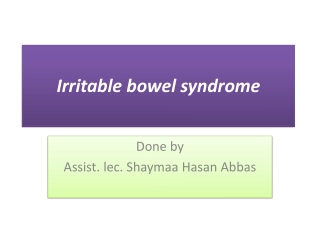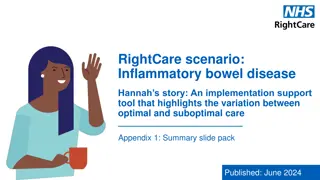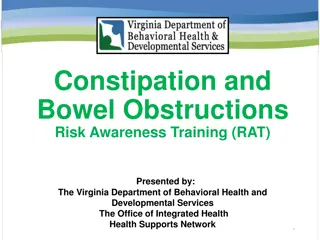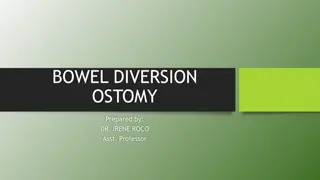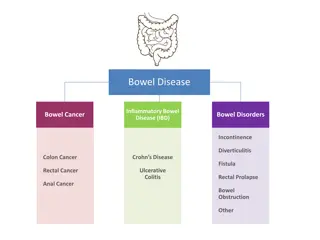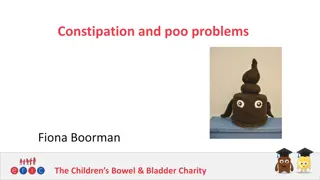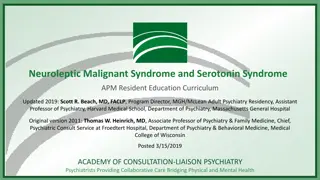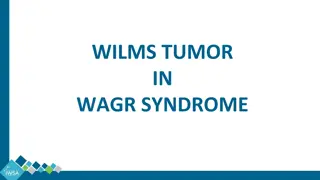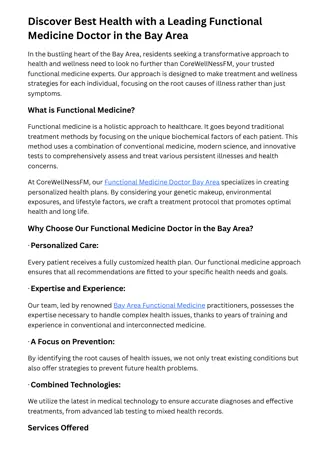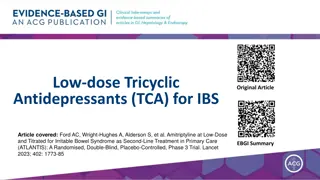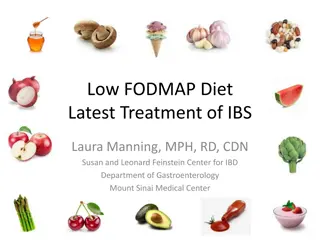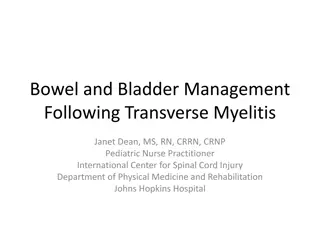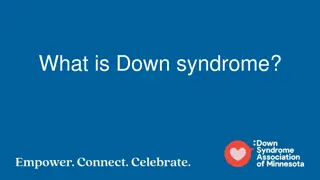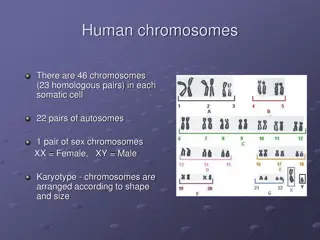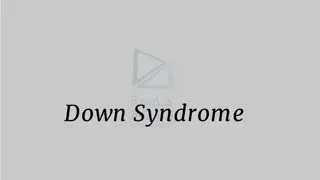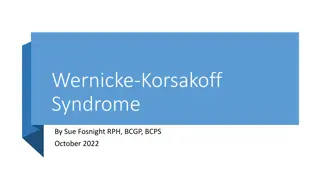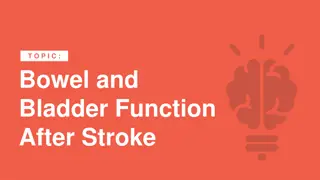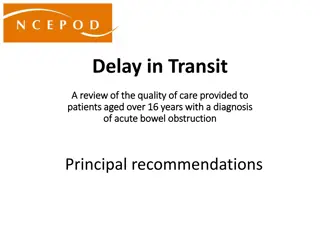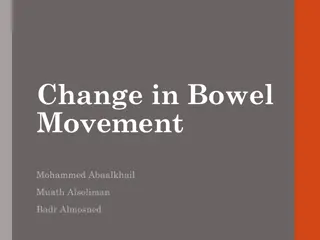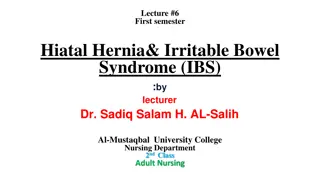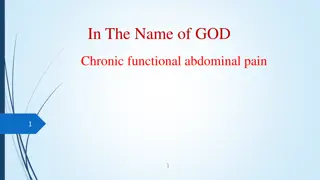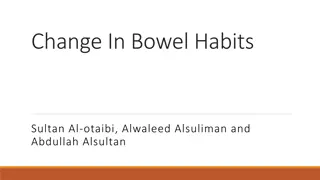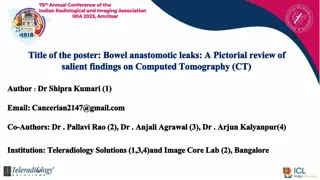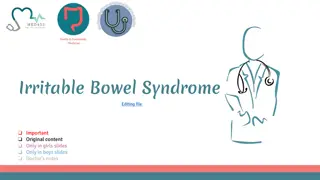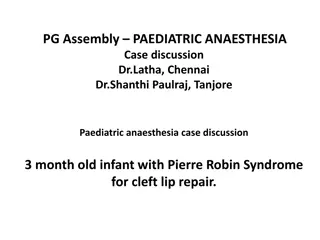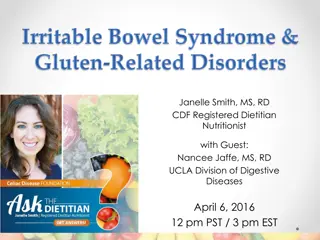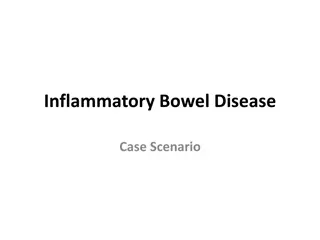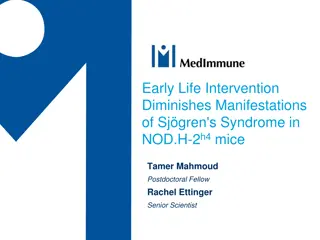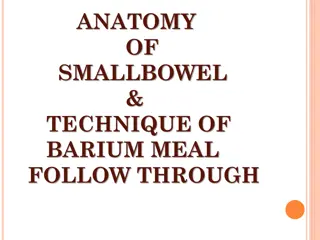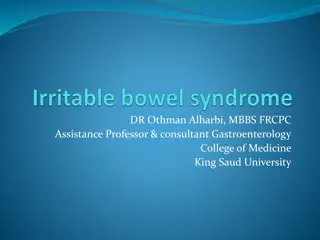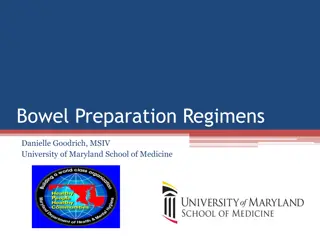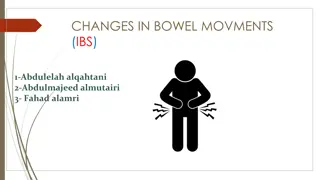Irritable bowel syndrome
Information on the aims of treatment, aggravating factors, treatment timescale, and non-drug and drug treatment options for irritable bowel syndrome (IBS). It also includes a list of relevant medications and their effects.
16 views • 39 slides
Hannah's Struggle with Inflammatory Bowel Disease: A Journey of Challenges and Lessons
Hannah, a vibrant young woman with a bustling social life and active routines, experiences a series of setbacks in her battle with Inflammatory Bowel Disease (IBD). Her journey highlights the importance of timely diagnosis, access to proper care, and comprehensive support services to manage the cond
0 views • 9 slides
Understanding Constipation and Bowel Obstructions Risk
This training program by The Virginia Department of Behavioral Health and Developmental Services focuses on defining constipation, identifying causes and complications, recognizing bowel obstructions, and understanding signs and symptoms of fecal impaction. Caregiver recommendations and the roles of
0 views • 26 slides
Understanding Bowel Diversion Ostomy: Definition, Classification, and Management
Bowel diversion ostomy involves creating an opening in the gastrointestinal tract to divert and drain fecal material. This summary covers the definition, purpose, classification (permanent vs. temporary ostomies, types of intestinal ostomies), management, assessment, and changes associated with osto
0 views • 14 slides
Understanding Bowel Diseases and Their Management
Understanding the causes and mechanisms of bowel diseases such as inflammatory bowel disease (IBD), bowel cancer, diverticulitis, Crohn's disease, and more is crucial for effective treatment. Genetic predisposition, environmental factors, immune malfunction, age-related issues, and lifestyle choices
0 views • 5 slides
Understanding Constipation and Poo Problems in Children
This resource provides insightful information on constipation and related issues in children, including causes, symptoms, treatments, and the impact on bowel and bladder health. It covers various topics such as bowel actions, medications, normal bowel function, and the significance of recognizing an
0 views • 21 slides
Neuroleptic Malignant Syndrome and Serotonin Syndrome Overview
This educational material provides an in-depth understanding of Neuroleptic Malignant Syndrome (NMS) and Serotonin Syndrome (SS) including their background, pathophysiology, clinical characteristics, differential diagnosis, risk factors, and treatment approaches. It also explores the historical back
3 views • 53 slides
Understanding Wilms Tumor in WAGR Syndrome
WAGR syndrome is a rare genetic condition associated with Wilms Tumor, aniridia, and developmental delays. Wilms Tumor is a form of kidney cancer mostly affecting children and is linked to genetic disorders like WAGR syndrome. The risk of Wilms Tumor is higher in children with WAGR syndrome, with po
1 views • 14 slides
Motor Abilities in Williams Syndrome and Their Importance
Motor abilities play a crucial role in the developmental journey of individuals with Williams Syndrome. From simple reflex movements to fine and gross motor skills, these abilities impact daily living, academic achievements, and overall cognitive and physical growth. Research on motor skills in both
0 views • 20 slides
Discover Best Health with a Leading Functional Medicine Doctor in the Bay Area
Dr. Carolyn Finnegan is a functional medicine doctor near Oakland, Berkeley CA. Get the best treatment for irritable bowel syndrome (IBS) and gastroesophageal reflux disease (GERD). Schedule a Free Consultation with Dr. Carolyn Finnegan in Berkeley C
0 views • 2 slides
Understanding Bowel Cancer: Facts, Prevention, and Awareness Efforts
Bowel cancer, also known as colorectal cancer, is a significant health concern, being the fourth most common cancer in the UK. It is essential to be aware of the symptoms, risk factors, and preventive measures associated with this condition. By maintaining a healthy diet, managing body weight, and s
0 views • 9 slides
Low-Dose Tricyclic Antidepressants (TCA) for IBS: ATLANTIS Study Overview
The ATLANTIS study evaluated the efficacy of low-dose amitriptyline (10-30 mg) in improving Irritable Bowel Syndrome (IBS) symptoms compared to placebo in a 6-month randomized controlled trial in a primary care setting. This important research aims to address the lack of definitive treatment guideli
0 views • 12 slides
Understanding Functional GI Disorders: A Comprehensive Overview
Functional GI disorders encompass a range of conditions affecting the gastrointestinal system, such as irritable bowel syndrome and disorders of the gut-brain interaction. These disorders are characterized by no structural abnormalities but are influenced by factors like motility disturbance, viscer
0 views • 42 slides
Understanding the Low FODMAP Diet for Managing IBS
Irritable Bowel Syndrome (IBS) is a common condition that affects millions of people, with symptoms like abdominal pain, bloating, and altered bowel habits. The Low FODMAP diet is a promising approach to managing IBS by reducing certain types of carbohydrates that can trigger symptoms. This diet inv
0 views • 53 slides
Bowel and Bladder Management Post Transverse Myelitis
Following transverse myelitis, there can be significant changes in bowel and bladder function, impacting storage, release, and coordination. Neurogenic bowel and bladder issues, differentiated by injury level, can lead to challenges in controlling sphincters and bathroom habits. Understanding these
0 views • 23 slides
Understanding Irritable Bowel Syndrome (IBS) and Effective Solutions
Irritable Bowel Syndrome (IBS) is a common digestive disorder affecting 1 in 5 people, characterized by symptoms like abdominal cramps, bloating, changes in bowel movements, and fatigue. This condition has various triggers, including infections, stress, and certain medications. Managing IBS involves
0 views • 36 slides
Understanding Chromosomal Abnormalities and Syndromes
Human cells have 22 pairs of autosomes and one pair of sex chromosomes, totaling 46. Karyotypes help diagnose chromosomal abnormalities by aligning chromosomes in size order. Nondisjunction during meiosis can lead to abnormal chromosome numbers in gametes. Disorders like Down Syndrome, XYY Syndrome,
0 views • 30 slides
Understanding Down Syndrome: Causes, Effects, and Characteristics
Down syndrome, also known as Trisomy 21, is a genetic condition caused by the presence of an extra 21st chromosome. Discovered by Dr. John Langdon Down in 1866, this condition affects individuals in various ways, influencing their development and abilities. People with Down syndrome may learn skills
0 views • 10 slides
Understanding Chromosomal Disorders and Syndromes in Humans
Human chromosomes play a crucial role in determining genetic traits and health conditions. An extra copy of chromosome 21 leads to Down syndrome, while conditions like Klinefelter's syndrome, Turner's syndrome, Trisomy 13, 18, and 23 have distinct symptoms and implications. Trisomies result from abn
0 views • 20 slides
Understanding Down Syndrome: Types, Characteristics, and Impacts
Down syndrome is a genetic condition caused by an extra chromosome, typically chromosome 21. This leads to physical and cognitive challenges, with individuals exhibiting unique abilities. The syndrome presents with distinctive physical features, such as flattened face, almond-shaped eyes, and poor m
2 views • 14 slides
Understanding Wernicke-Korsakoff Syndrome: Overview and Clinical Considerations
Wernicke-Korsakoff Syndrome (WKS) comprises Wernicke's Encephalopathy (WE) and Korsakoff Syndrome. WE presents with altered mental status, ocular signs, and ataxia, while Korsakoff Syndrome manifests as amnesia and confabulations. Untreated WE can progress to Korsakoff Syndrome in about 80% of cases
0 views • 52 slides
Understanding Gut Health and the Role of Probiotics
Gut health plays a crucial role in overall well-being, with a diverse community of bacteria in the gut contributing to digestion, immunity, and metabolic processes. Probiotics, beneficial microorganisms, can help maintain a healthy gut environment. This presentation by Dr. Jacqueline Wolf explores t
0 views • 31 slides
Understanding Bowel and Bladder Issues Post Stroke
Bowel and bladder incontinence are common after a stroke, often due to brain damage affecting control functions. Factors like mobility can exacerbate these issues, leading to discomfort, infections, and other complications. Managing incontinence involves assessing individual needs, recognizing signs
0 views • 10 slides
Review of Care for Patients with Acute Bowel Obstruction: Recommendations and Key Findings
This review assesses the quality of care provided to patients aged over 16 years with acute bowel obstruction. Significant delays were identified in the care pathway, from imaging requests to availability of operating theatres. Recommendations include prompt CT scans with intravenous contrast for de
0 views • 32 slides
Understanding Changes in Bowel Habits and Irritable Bowel Syndrome (IBS)
Changes in bowel habits can indicate underlying conditions like Irritable Bowel Syndrome (IBS), which affects millions worldwide. Learn about the symptoms, diagnosis, and management of IBS through practical examples and multiple-choice questions. Discover how psychological treatments like cognitive-
0 views • 58 slides
Understanding Hiatal Hernia and Irritable Bowel Syndrome (IBS) for Adult Nursing
A hiatal hernia involves the protrusion of the stomach through the diaphragm, leading to various types and complications. Symptoms may include heartburn and dysphagia, diagnosed through barium studies and endoscopic exams. Management includes lifestyle changes, medication, and surgical repair. Nursi
0 views • 15 slides
Understanding Chronic Functional Abdominal Pain: Clinical Diagnosis and Management
Chronic functional abdominal pain is characterized by persistent discomfort lasting over three months, with various underlying causes such as gastrointestinal disorders, genitourinary issues, and miscellaneous conditions. Diagnosis involves differential assessment and recognizing functional disorder
0 views • 26 slides
Understanding Change in Bowel Habits and Irritable Bowel Syndrome
This informative content covers topics such as the definition, etiology, and classification of Irritable Bowel Syndrome (IBS), the diagnosis and management of IBS, alarm symptoms to look out for, and when to refer patients to specialists. It also includes a role-play scenario for a focused abdominal
1 views • 33 slides
Bowel Anastomotic Leaks: Salient Findings on CT - Pictorial Review at IRIA 2023, Amritsar
Anastomotic leaks post gastrointestinal surgery can have serious consequences if undiagnosed. This pictorial review presented at the 75th Annual Conference of the Indian Radiological and Imaging Association in Amritsar focuses on the importance of timely CT imaging interpretation for detecting and d
1 views • 10 slides
Understanding Irritable Bowel Syndrome: Pathophysiology, Symptoms, and Management
Irritable Bowel Syndrome (IBS) is a common gastrointestinal condition with uncertain pathophysiology involving factors like motility, hypersensitivity, inflammation, and gut microflora. Symptoms include abdominal pain, altered bowel habits, and bloating. Diagnosis is based on Rome IV criteria, and m
0 views • 9 slides
Paediatric Anaesthesia Case Discussion: Challenges of Anaesthetizing an Infant with Pierre Robin Syndrome
Pierre Robin Syndrome (PRS) presents challenges in paediatric anaesthesia, especially in infants undergoing procedures like cleft lip repair. PRS is characterized by micrognathia, glossoptosis, and respiratory distress. Other syndromes associated with cleft lip include Treacher Collins syndrome, Gol
0 views • 56 slides
Understanding Irritable Bowel Syndrome (IBS), FODMAPs, and Gluten-Related Disorders
This webinar discusses the relationships between Irritable Bowel Syndrome (IBS), FODMAPs, and gluten-related disorders, covering topics such as the definition of IBS, its relationship with Celiac Disease and Gluten Sensitivity, the Low FODMAP diet, and functional gut disorders. Functional GI symptom
0 views • 24 slides
Inflammatory Bowel Disease Case Study: Diagnostic Challenges and Treatment Decision
A 56-year-old male with a history of inflammatory bowel disease presented with severe symptoms necessitating hospitalization. Despite steroid therapy, lack of improvement led to consideration of a total colectomy. Colonoscopy and biopsy results favored ulcerative colitis over Crohn's disease. This c
0 views • 31 slides
Understanding Imposter Syndrome: Causes, Effects, and Overcoming Strategies
Imposter Syndrome is characterized by feelings of inadequacy despite evidence of success, chronic self-doubt, and fear of being exposed as a fraud. It affects individuals' work performance, leads to avoidance of additional duties, assigns success to external factors, and can result in burnout. Howev
0 views • 10 slides
Early Life Intervention Diminishes Sjögren's Syndrome Manifestations in Mice
Early life intervention has been shown to reduce the clinical manifestations of Sjögren's syndrome in NOD.H-2h4 mice, which mimic key features of the human autoimmune disease. The syndrome is characterized by salivary gland autoantibodies, ectopic lymphoid follicles, reduced salivary and tear flow,
0 views • 19 slides
Understanding Small Bowel Anatomy and Barium Meal Technique
Exploring the anatomy of the small bowel, including the duodenum, jejunum, and ileum, as well as the technique of a barium meal follow-through. The small bowel is a convoluted tube extending from the pylorus to the ileocecal valve, averaging 6-7 meters in length. The duodenum, characterized by its C
0 views • 34 slides
Understanding Irritable Bowel Syndrome and Its Pathophysiology
Irritable bowel syndrome (IBS) is a common gastrointestinal disorder characterized by chronic abdominal pain and altered bowel habits. Despite the absence of organic causes, patients experience symptoms such as abdominal distention, bloating, and visceral hypersensitivity. The pathophysiology of IBS
0 views • 19 slides
Bowel Preparation Regimens for Colorectal Cancer Screening
Overview of bowel preparation regimens for colorectal cancer screening, emphasizing the importance of adequate bowel cleansing to enhance the effectiveness of colonoscopy. Highlights the impact of different dosing regimens on patient compliance, colon cleansing, and detection rates of small polyps.
0 views • 20 slides
Understanding Irritable Bowel Syndrome: Symptoms, Diagnosis, and Management
Define constipation and diarrhea, discuss the definition, etiology, and classification of IBS, explain how to diagnose IBS, list alarm symptoms and differential diagnosis, provide a management plan and follow-up, and recognize when to refer to a specialist. People with irritable bowel syndrome may s
0 views • 35 slides
Understanding Continence Care in the Community
Continence care in the community focuses on maintaining normal bladder and bowel functions to support individuals in managing their toileting needs effectively. Continence involves being aware of bodily signals, knowing when and how to void or defecate, managing clothing, storing urine or bowel move
0 views • 38 slides
